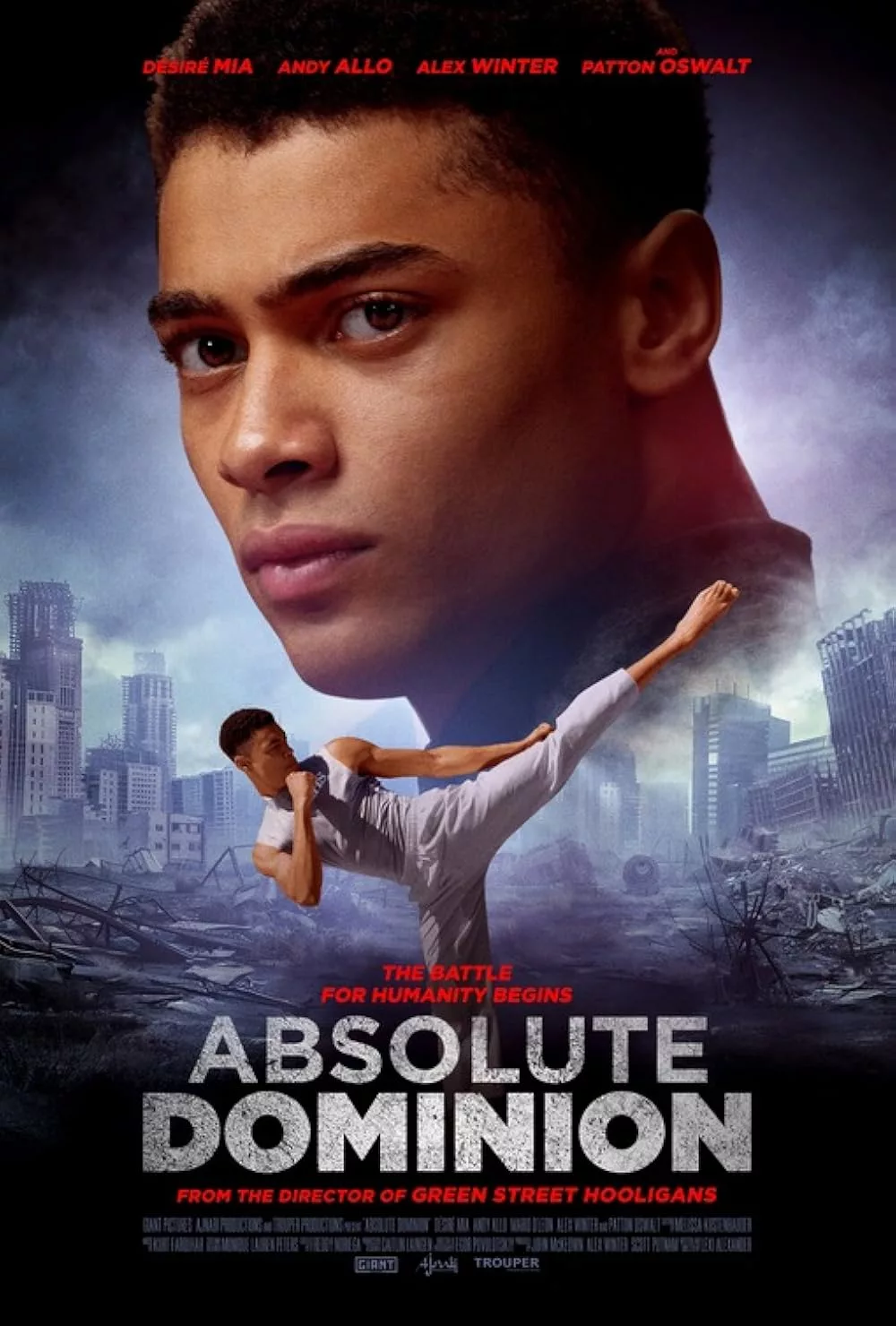The premise behind “Absolute Dominion” is intriguing enough to give it a bit of slack in the hopes it’ll coalesce into something stirring or stimulating. Written and directed by Lexi Alexander, the film opens in 2044 amid a destructive religious war that’s seen the decimation of sites ranging from Fenway Park to Marrakech. Playing the online personality Fix Huntley, Patton Oswalt has an idea that could easily be ripped from one of his standup sets: Each faith should submit a challenger for a royal rumble whose outcome will decide the world’s sole religion. Jump ahead to 2064, and peace is reigning as this exhibition’s last wild card tournament commences. Here, a hopeful Sagan Bruno (Désiré Mia) trains for the upcoming bouts that could spell danger.
“Absolute Dominion” is a high-concept sci-fi flick whose many pieces move but rarely settle in satisfying positions. Sagan is a genetically engineered fighter representing the Institute of Humanism and Science (IHS), a group of scientists who aren’t at all religious. He’s physically and mentally perfect in every single way except the narcoleptic spells he experiences. Still, as an unranked wild card, no one knows who he is, just how his dad, Dr. Jehuda Bruno (Alex Winter), likes it. However, once Sagan begins racking up victories, the word among his challengers spreads—putting pressure on his personal protection officer Naya (Andy Allo) to safeguard him.
The film leans on hit-or-miss world-building to pull in your attention. There’s the colorful emcee/commentator Ceylon (Alok), who, like Faye Dunaway in “Network,” craves ratings. There are also simple settings in the high-security hotel and tournament space, whose shades of green and blue at least keep futuristic minimalism from appearing dour. From these building blocks, particularly the film’s tournament conceit, many will probably immediately equate “Absolute Dominion” to the “Hunger Games” franchise. However, the violence here is neither as vicious nor as deadly as the film series. Rather, the action is built upon the clean but formidable technique demonstrated by Sagan.
It’s not terribly surprising to see that Alexander dreamed this up. The filmmaker behind “Punisher: War Zone” certainly knows their way around action-stained set pieces. Also, of course, Alexander was a professional kickboxer and stunt person before becoming a director. So the best compliment you can aim at “Absolute Dominion” is its efficient and seamless choreography, which relies on wide shots to take in the pugilistic movements in relation to their environments.
The film’s other crafts, unfortunately, lack vigor. Devoid of uniqueness and body, the score sounds like a temp piece. Also, Alexander’s splashes of slow motion in fights often feel tawdry and lifeless when combined with the limp music. When the film isn’t watching the fights, it cuts to exteriors of people in different locations taking in the matches at watch parties. These exteriors lack so much verve—amounting to people being told to celebrate without knowing what they’re celebrating—you wonder if Alexander could’ve simply done without them.
That absence of energy pervades “Absolute Dominion.” Because Sagan is positioned as a serene messiah-coded figure, even when he does express a crush on Naya, he’s mostly cold and distant. That quality isn’t necessarily bad to have in a protagonist; it just requires the film’s emotion to arise from someone else. The problem? Just about everybody else here is also cold and distant. So, one wonders what exactly Alexander wants us to feel.
Instead, the film operates as a thought experiment, critiquing religion’s hold on our potential devastation and peace. We’re told, for instance, that fighters like Sagan need protection because, since the tournament began, eight separate fighters have been assassinated. Tellingly, they’re all Satanists. Jehuda theorizes that people need to believe in something, and Satanists and IHS are threatening because they’re like believing in nothing.
Though try as Alexander might, she struggles to pull that rich observation forward, particularly with regard to the film’s villains: Commander Zimmer (Julie Ann Emery) and her underling Nigel (John Siciliano). As the head of the military, Zimmer is especially worried about the potential instability someone like Sagan represents. The pair throw a few obstacles Sagan’s way, including manipulating the tournament by inserting higher-ranked fighters as opponents against the upstart Sagan, but their threatening presence mostly falls flat because of rote dialogue and some sizable underwriting. If Sagan represents such a threat to people’s beliefs, for instance, then why isn’t his presence causing greater instability in the outside world? Sure, he represents a wild card. But once he goes on his string of victories, shouldn’t his success have some effect on the normal people who are watching? Rather than cheering him on, why aren’t more people on the outside openly hostile to Sagan?
Maybe that’s the point Alexander is making. Despite what the powers that be believe, people don’t actually need religion to maintain order. They’ll applaud for nothingness if it comes in a nice enough package. But that interpretation, once again, feels like giving the film some additional slack because its concept is so intriguing. At some point, premise needs to graduate into a story with deeply felt emotions, memorable characters, and provocative ideas that at least mostly land. “Absolutely Dominion” is without all three.




















